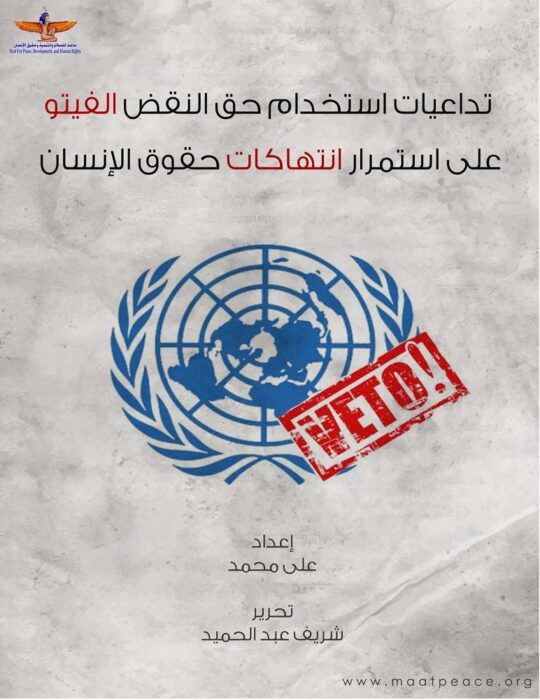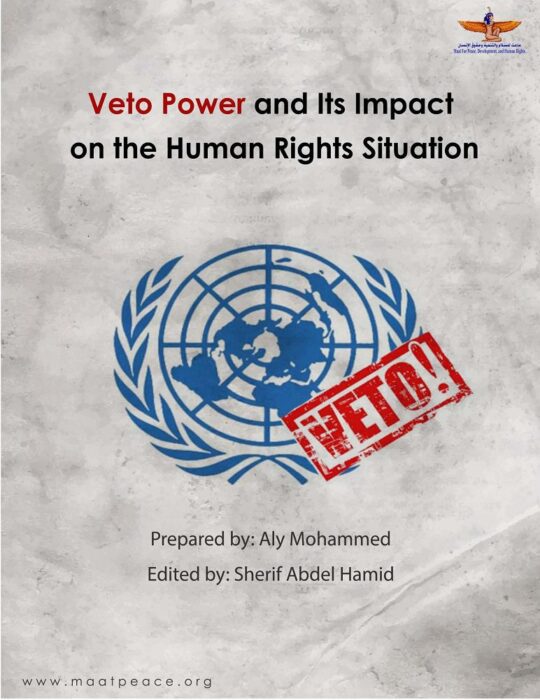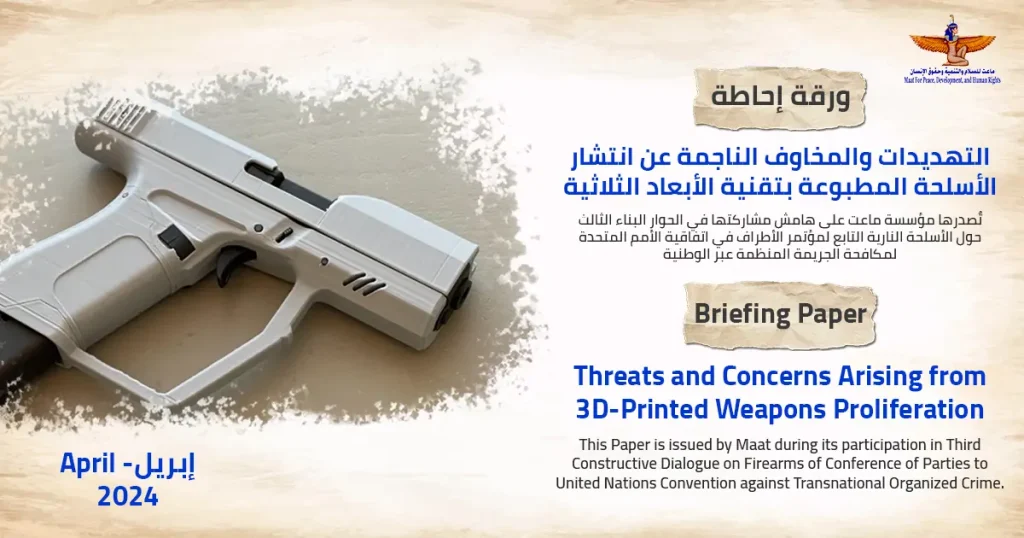Okeil: The permanent members use the "veto" power to undermine human rights
Sherif Abdul-Hamid: Using the veto power in the Syrian crisis raised the death toll from 2,700 to half a million
Ali Muhammed: We must work on restructuring the Security Council so that the main criterion for selecting countries is respect for human rights
Maat for Peace, Development and Human Rights issued a new report entitled “The Repercussions of Using the “Veto” Power on the Continuous Human Rights Violations,” which emphasized that the use of the veto power has negative repercussions on a huge number of civilians not only in the Middle East but also in other regions, especially when this right is used to prevent the passage of humanitarian aid to the civilian population living in emergency crises, and the consequent disasters and violations of human rights, topped by the violation of the right to life, in addition to the use of this right by the five permanent members of the Security Council to disrupt ceasefire or reach a humanitarian truce in some areas such as the occupied Palestinian territories and Syria, which will only lead to more civilian casualties.
The report clarified that despite the calls to reform this flawed system in the Security Council, which is represented in the misuse of this power to cause serious violations that amount to war crimes, and despite the United Nations General Assembly resolution entitled “Uniting for Peace” which entailed giving the General Assembly the opportunity to issue resolutions in case of failure by the Security Council do so when one of the permanent members uses the veto, these calls for reforms are often met with rejection by the five permanent members. Moreover, in the cases where the United Nations General Assembly (UNGA) decided to take an alternative path, it did not receive any attention from the international community.
This report focused on the use of the veto power in the context of violating the human rights of the peoples of some countries, while focusing on the cases in which the United States, Russia and China used this power, which is approximately 61 times only in relation to the Palestinian territories occupied by the United States of America or in Syria by Russia and China, in light of the fact that the use of this power implies a lack of real guarantees to protect civilians from the successive violations they are subjected to, and the contribution to widening the impunity gap and the failure to ensure accountability for these violations, some of which may amount to crimes against humanity.
Ayman Okeil, president of Maat, said that the UN bodies’ main goal is to respect and promote human rights, which is guaranteed by international instruments and conventions, but misusing the veto power rigth the five permanent members of the Security Council has not only prevented the achievement of this goal, but also helped in many times to violate the rights of civilians in more than one country. The intervention of those countries that have the veto power has often resulted in the continuation of wars and conflicts and the violation of the rights of civilians, such as America’s use of the veto power in the Palestinian / Israeli conflict 81 times, more than half of them were related to the Palestinian cause with the aim of disrupting decisions condemning the Israeli violations in the Occupied Palestinian Territories, or referring its crimes to the International Criminal Court, or for failing to stop the illegal settlement in Jerusalem and the West Bank.
For his part, Sherif Abdul-Hamid, director of the Research and Studies Unit at Maat, said that the arbitrary use of the veto power by the five permanent members of the Security Council results in a wide range of violations that contradict basic human rights, such as violating the right to life, allowing impunity, increasing violations and the continuation of wars and conflicts. In Syria, for example, nearly 13 million people need humanitarian assistance in 2021, an increase of 20% compared to 2020. The suffering of these people, who are deprieved of their basic rights, has exacerbated due to Russia and China’s use of the veto power against a UN resolution to pass humanitarian aid in Syria. Abdul-Hamid added that Russia has used its veto power since the beginning of the Syrian crisis more than 16 times, during the period from October 2011 to October 2020. During this period the death toll rose from 2,700 to more than half a million Syrians, and about half of the Syrians have become refugees or internally displaced persons. Syria has become among the fragile states in which militias and extremist groups thrive.
In the same context, Ali Muhammad, a researcher at Maat, said that obstructing humanitarian aid from reaching the affected civilians is inconsistent with the principles and provisions of international human rights law and international humanitarian law, and it may amount to war crimes. Besides, Muhammad called on the international community to urgently develop a code of conduct by UN member states that limits the use of veto power on specific issues, such as crimes involving serious human rights violations, ethnic cleansing and genocide, and draft resolutions related to the delivery of humanitarian aid to conflict-affected areas. He also called for the necessity of structuring the UN Security Council and discussing the issue of permanent membership, in which the main criterion must be the amount of humanitarian services provided by the country to promote international law and protect human rights.
![]()
 |
 |











